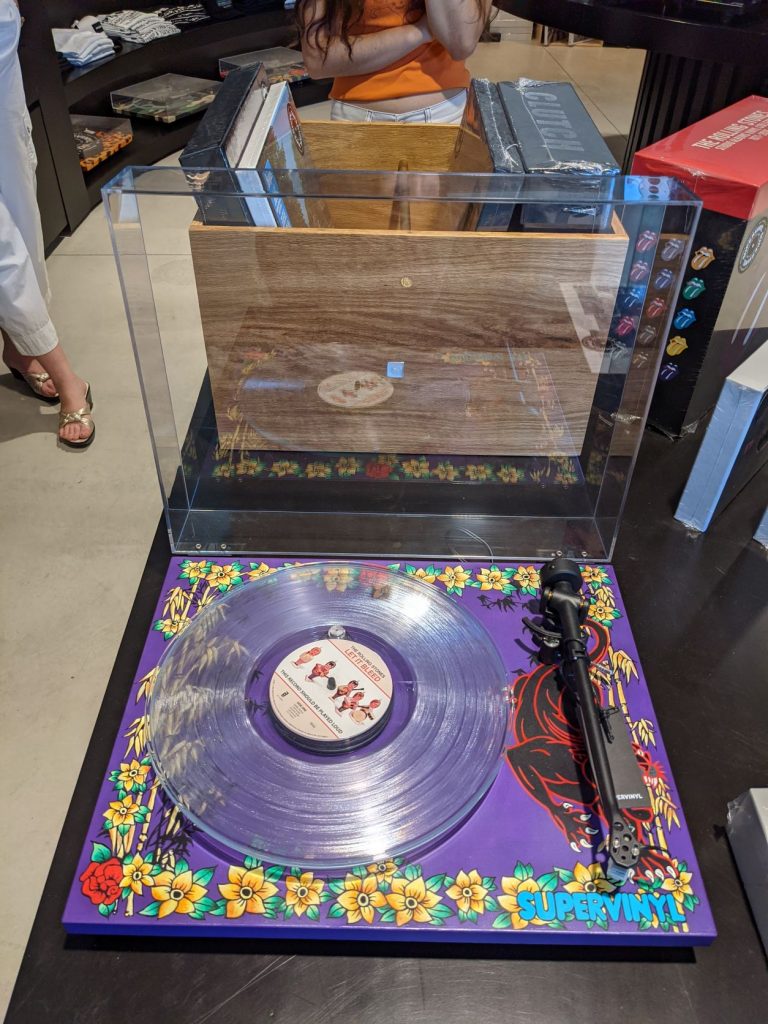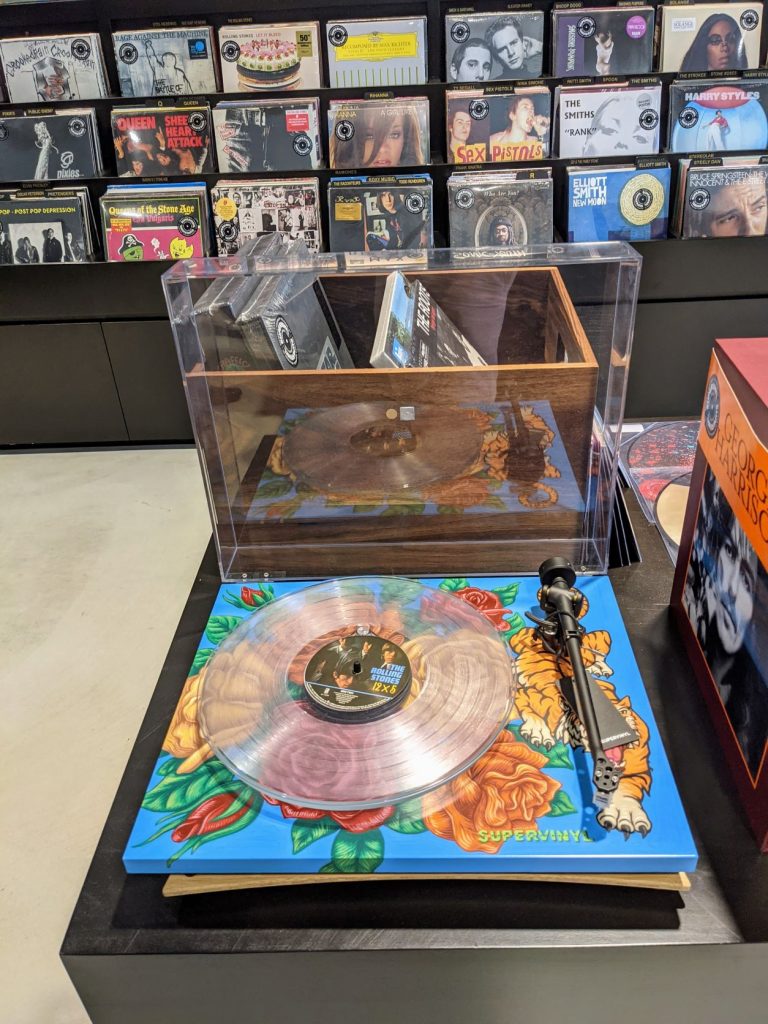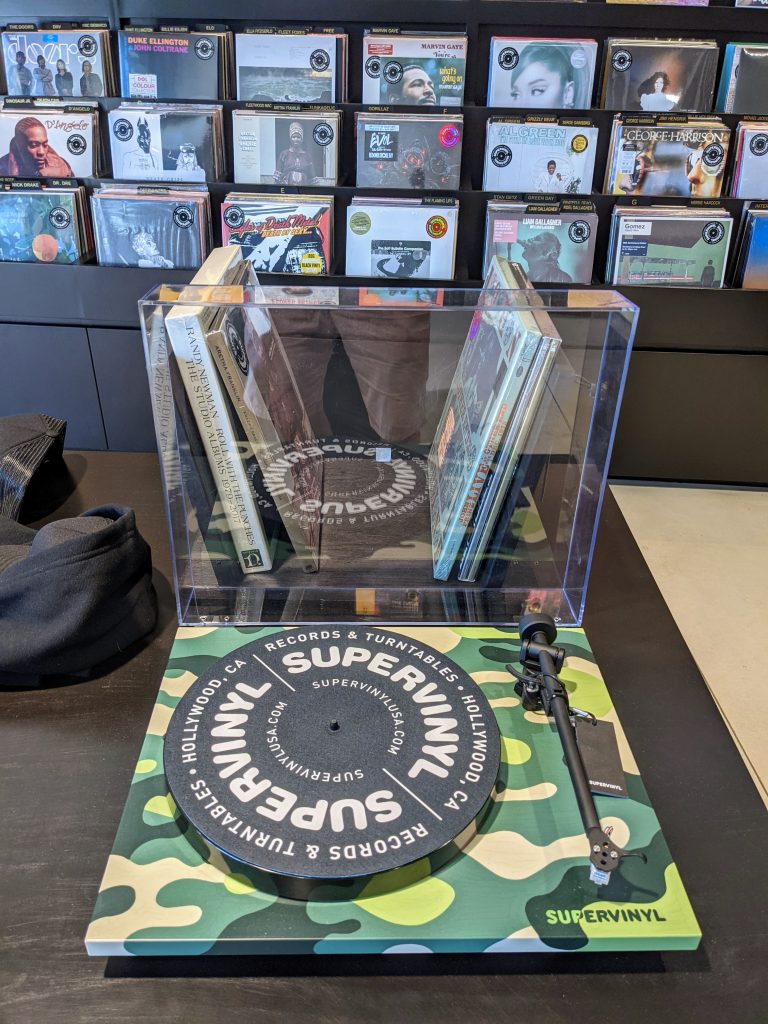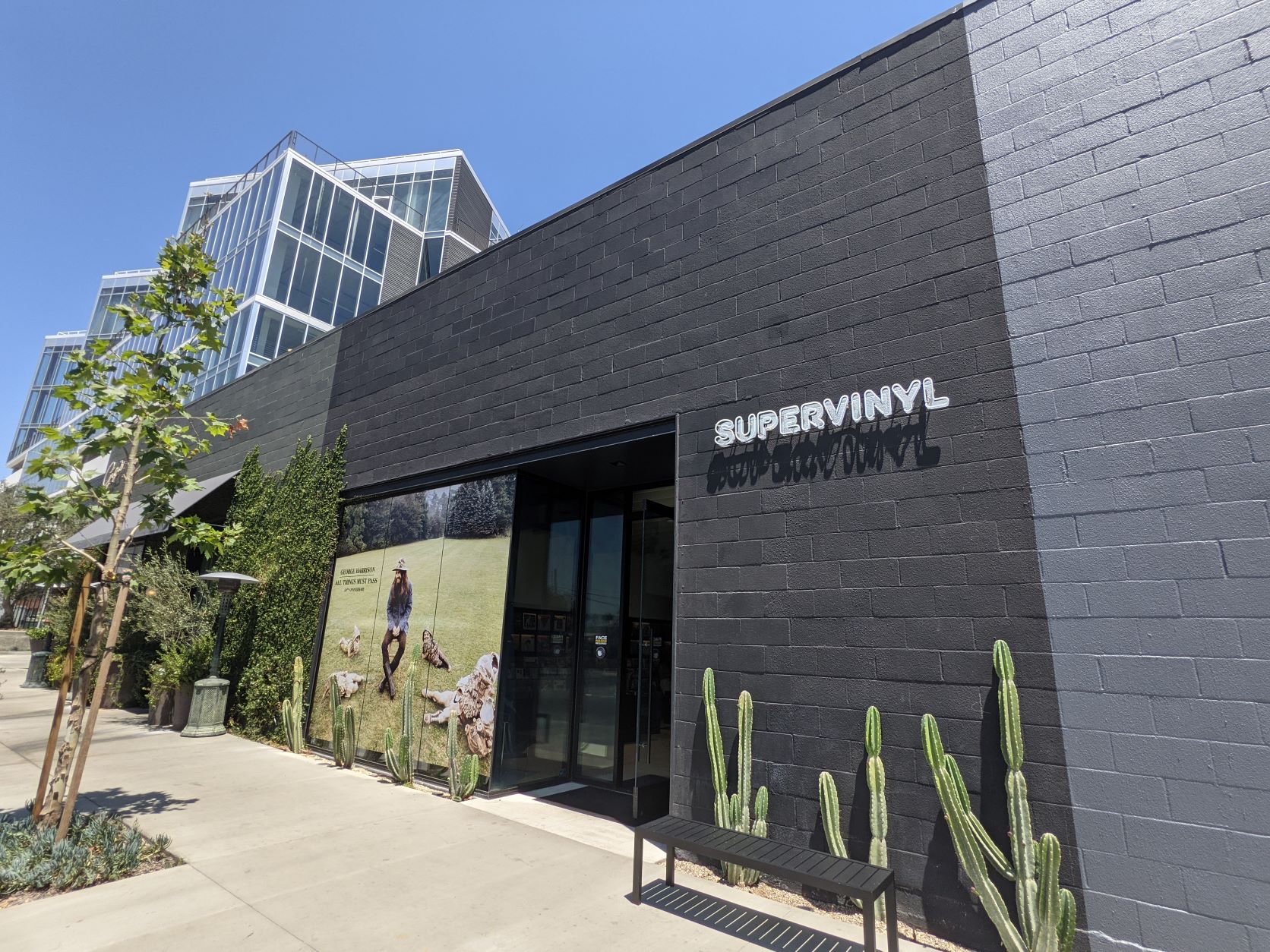
The Los Angeles-based Supervinyl boutique sells a unique mix of records and audio equipment by Rega, McIntosh, HRT, Sonus Faber, and Sennheiser. We spoke with owner Barry Perlman, who co-founded Lucky Brand jeans, on his distinct hybrid retail concept, and how working in fashion influenced the way he sells electronics.
What’s the history of Supervinyl?
Barry Perlman: My background has always been in retail, since I was 17 and I opened up a jewelry store in Miami with my two best buddies in the 1970s, but I’ve never been in the audio or record business, much less the audio or record retail business.
Before this, I was manufacturing blue jeans and had retail stores. I moved out to California in the late 1980s and started manufacturing jeans – Lucky Brand— with my best buddy. We started out with just a blue jean and a T-shirt and we had one store on La Brea [Avenue]. That was for 22 years. We had a few hundred stores and I learned so much about the manufacturing and retail of blue jeans and T-shirts.
I’m not an audiophile guy and don’t know a lot about audio equipment or even the record business in general, but I felt I could apply some of the mistakes I’ve made – and I’ve made tons of these, by the way – to this cool little boutique record store that also sold audio equipment. I wasn’t seeing a place where you could buy records and have a selection of turntables in the same place, in L.A. or anywhere else. I mean, there are record stores that have turntables, but they’re usually in a box and aren’t of high quality.
I was originally thinking of doing this in the Arts District in downtown Los Angeles and even had a spot picked out, but I kept thinking — vinyl, Hollywood — should I be in Hollywood? Then one day, I was catching up with a friend of mine who had developed a few buildings on Sunset Boulevard, where there was a new Fred Segal store and a hotel, and told him about the new record store concept for downtown. He said “Wait, just come to Sycamore [Avenue] and look at some buildings over there that I’m going to renovate.” So I came over here and flipped. I knew about this street the 99-cents store around the corner. It was always kind of a sketchy street, but this little stretch I have always loved. He told me they were getting Sightglass Coffee and Tartine and other business, all of which are here now. I looked at the building and said, “I’ll take it,” and that was it. I have never looked back.
Then I stopped being in the clothing business a few years ago and took a break, and to me Supervinyl was the most natural next step for me. I’ve always loved music, and it was a big part of what we did when we were manufacturing jeans. We had lots of the artists who you see on these racks here who played for us at different events and shows. I mean, blue jeans and rock and roll – they’re like apple pie and vanilla ice cream, you know what I mean?
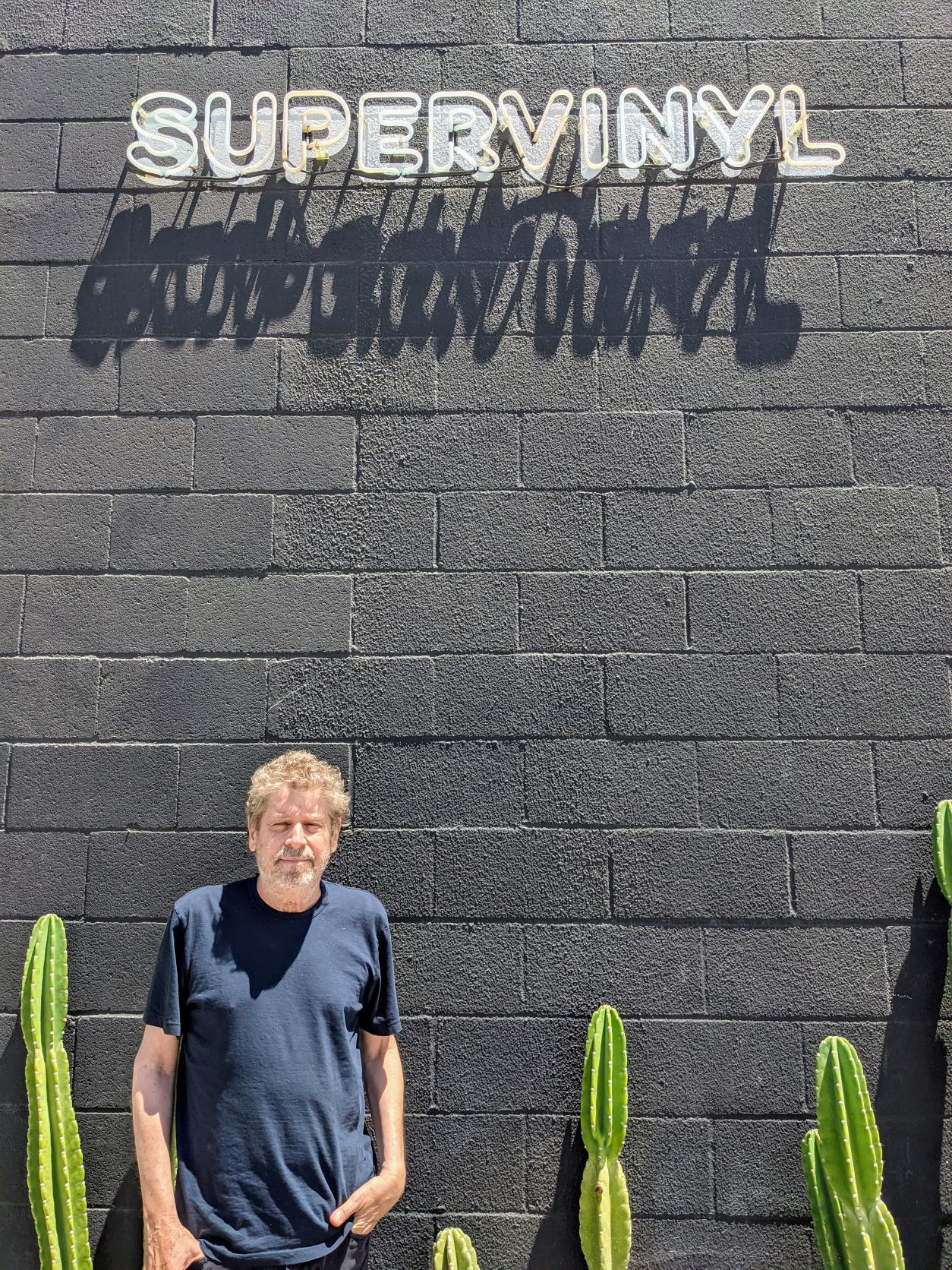
So how and why did you get Rega, McIntosh, High Resolution Technologies (HRT), Sonos Faber, and Sennheiser into the store? Those brands are usually only found at dedicated audio stores, and select ones at that.
BP: Well, I have a McIntosh amp that’s 25 years old, and I bought a Rega P1 to go with it. And then I bought a Rega P3 and used it for a couple of years when thinking about the record store. I just love that turntable and went out and looked at the marketplace and saw that there were a lot of brands to buy from, but I’m a very narrow and deep sort of merchant. Less is more, and I like to get behind only a few products. If I carry three or four other brands of turntables, then I think it gets confusing for the customer. I like to get behind what I’m representing.
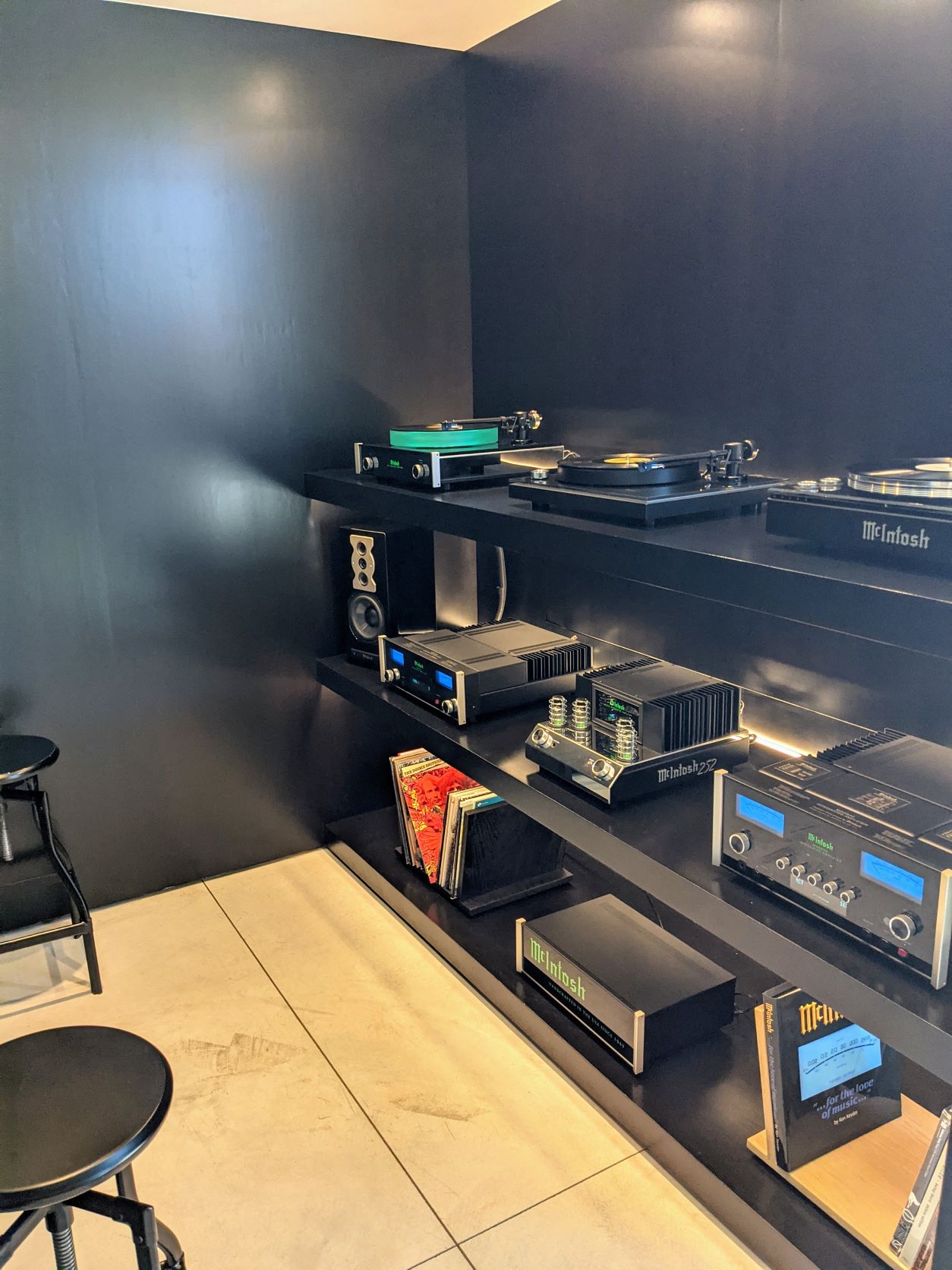
As for McIntosh, I’ve loved that brand since I was a kid, and I could never afford it. But I remember working hard when I was in high school in a pizza place, and when I finally had a nickel, I got myself a McIntosh amp. I don’t even know how I was able to get the money for it, but I’ve always known that brand. So when I was thinking of doing Supervinyl, that was my one thing: I had to get McIntosh in here because I just know how great it is. Yes, it’s way more expensive than lots of audio products, but it’s that much better.
I wasn’t sure I could get it. I talked to a few guys and they led me to believe that the company wouldn’t work with a guy who’s just opening up a store, no matter who I am or what I’ve done already in retail. And at first, the companies did tell me that they weren’t interested, that they had enough accounts. So I did something I’ve never done in my life. I wrote a letter to the President of McIntosh, Charles Randall, who was fantastic. I said: “Listen, I’m a hybrid, a record store selling McIntosh. I promise you I’ll represent it the best I can. I’ll make it look great. I’ll get behind it.” You have to think differently today. Teslas are now sold at shopping malls. No one would have ever thought that a few years ago. And I got a phone call from him. We talked for a while and I ended up getting a line, and I’ve been doing well with it. They’re pleased, and so am I.
Kudos to McIntosh because it took a shot on an unknown like myself. I’ve only been doing this for three years, and I don’t know the entire audio business, but it can be very uptight and set in its ways as to how things are done, but I come from the blue jean business, where anything goes. Things get disrupted —people used to take taxis and then Uber came along – and the audio world is in some cases a little bit staid. If there are companies that I’ve reached out to and they don’t want to sell to me, that’s okay, too. I’m sticking with the two brands that I think are two of the best. I’m happy to add to that mix down the road, but it has to be good.
So who comes in here to buy McIntosh components and Rega turntables?
BP: The other thing I said to Charles was how I didn’t necessarily want existing McIntosh customers. I want to turn McIntosh on to new people, so I’m happy that some of my customers have never heard of the brand. Right in this immediate area, within walking distance, is Sirius XM Satellite Radio, Chrome Hearts, Jeffrey Deutsch Gallery, and The Record Plant, which is a big recording studio. And people from all those places are constantly walking down the street and floating in here. I just tell them to listen to it and they go crazy. I’m getting all kinds of people – young, middle-aged, older. It’s a cross-section of people and I wouldn’t say it’s a demographic, but as my best buddy Eugene would say, it’s a psychographic.
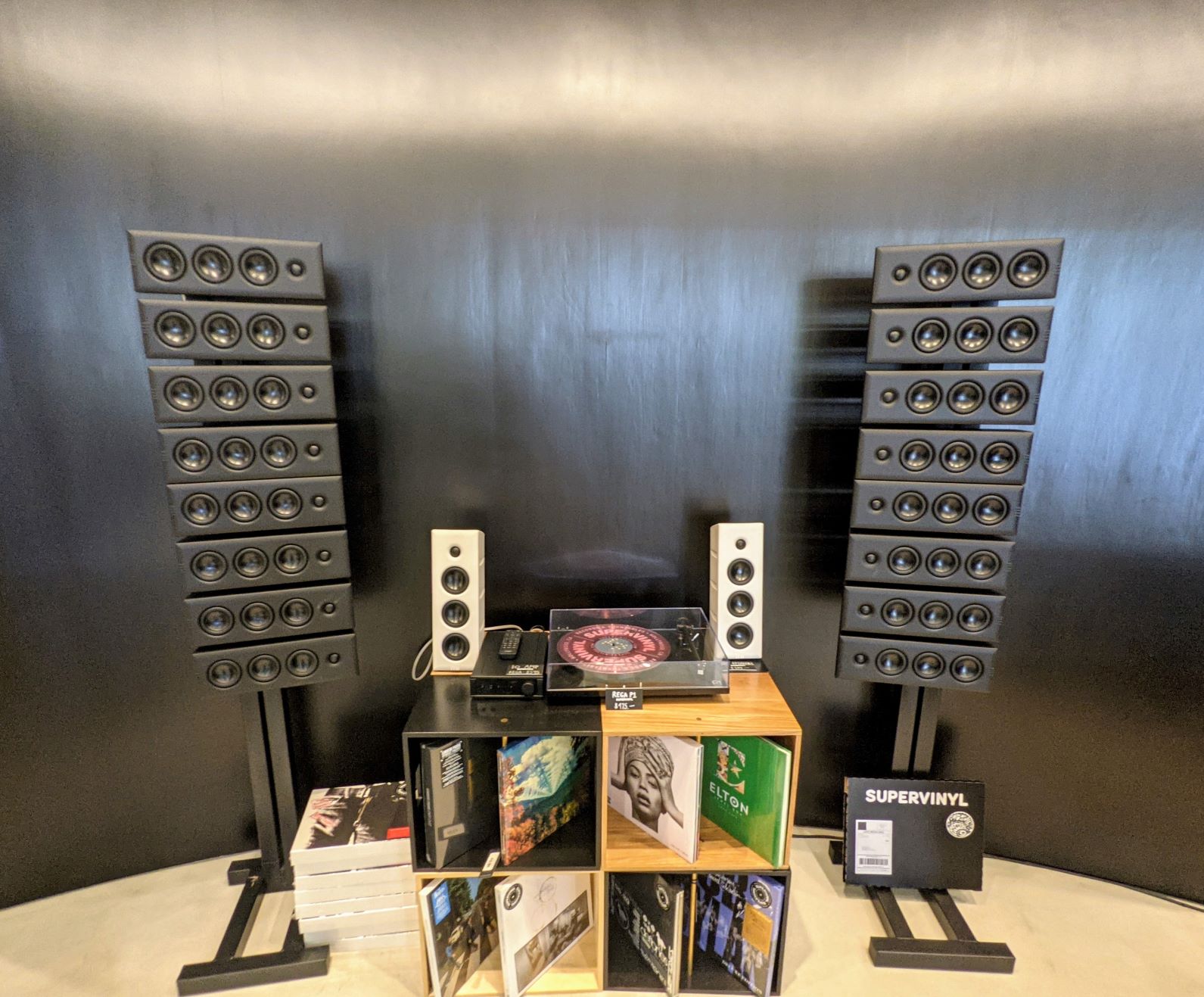
Shopping for higher-end components can be very intimidating for many people. How are you making these brands accessible?
BP: It’s funny; I felt that way as a kid. I used to shop at the jeans stores in Miami — I must have been 16 or 17 — and there were always “cool” people on the floor and they made you feel a little intimidated. It made me think, man, if I ever open up my own store, I want everybody to feel welcome and comfortable, and I’ve carried that with me my whole life. Before I opened Supervinyl, about five or six years ago, I went to an audio store and was sitting there, about to buy a turntable, credit card in my pocket ready to go, but the sales guy talked so over my head. I didn’t understand what he was talking about. I ended up walking out of the store and didn’t buy anything.
So I thought, when I open up Supervinyl, it’s going to be friendly and easy. I’m here almost every day, seven days a week. And when I or anyone else who works here, including my son Jesse, see someone come into the store, we always say hello, but not in a canned “how can I help you” way. It’s very relaxed; we have comfortable chairs in the store. We’re here to help people and talk anybody through any of the turntables and the McIntosh stuff; we know them all pretty well now.
Let’s say it’s someone’s first time buying something, and they want to step up to a McIntosh. I’ll have somebody go to their house and install the whole thing, show them how to work everything. I get letters and texts and emails from customers who have bought them from us. One lady said she started crying because it sounded so good. Another husband and wife came in and bought a McIntosh setup – amp, turntable, speakers – and they loved it so much they sent me a bottle of champagne. It’s crazy. It’s almost like I’m selling happiness. People are so open and excited, and this is a fun store. Even in the jeans business I didn’t get this kind of thing. I go into stores to buy stuff today, and it just doesn’t have the same feeling. Here, it’s fun; we’re playing music all day, we’re talking about music, people’s favorite bands, and so on.
Do you only sell McIntosh speakers?
BP: No, we also sell HRTs and Sonus Faber, out of Italy. We only have a tight selection of products, but those are what we think will sell best at that price point. We have this dedicated area where we have all the equipment. One thing, to make it easier for the customer is that I usually sell integrated amps if it’s a first-time buyer, because it’s a little easier and involves less equipment. And then we’ll mix the Rega turntables with the McIntosh amps.
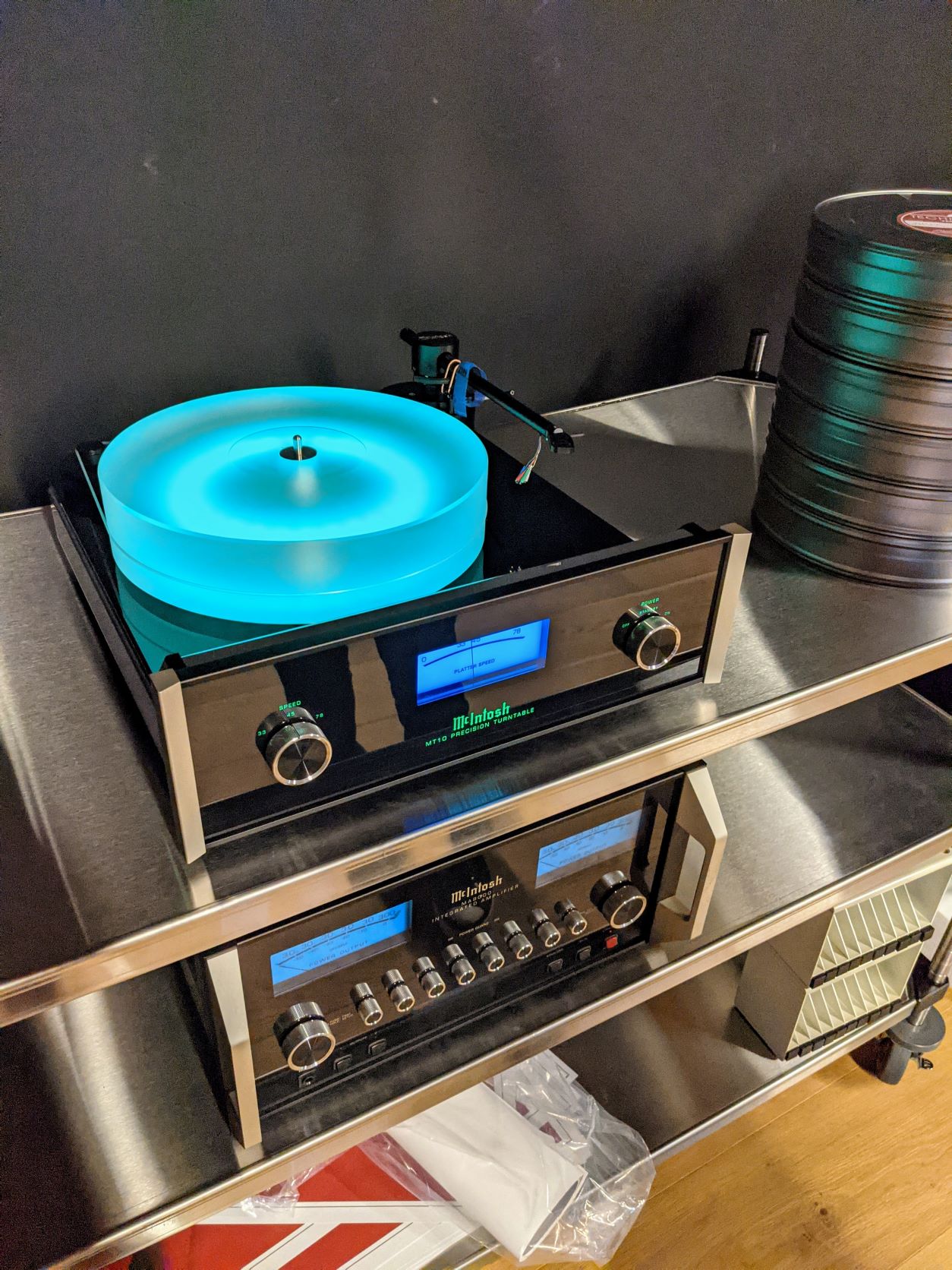
In terms of the audio equipment, what would you say sells the best here?
BP: Well, this amp (McIntosh MA 8900), paired with this turntable (McIntosh MT5), and these speakers (McIntosh XR 50-B). We also sell quite of few of this integrated turntable (McIntosh MTI100), which has an amp built-in. I also make sure to stock everything I sell. I make sure I have two or three of everything that’s out here upstairs. In terms of turntables, I’d say probably the Rega P2. People like the glass platter, and its upgradeability. You can get a turntable for half the price, but with the Rega P2, you only have to do this once.
Has the chip and supply-chain shortage affected you?
BP: Yes, McIntosh and Rega are both a bit behind. I have orders in that I’ve been waiting on, but everybody’s a little bit behind. I always have an order in and never have nothing here. In some ways, it’s easier for me because most audio stores have 10 lines of a product. They probably carry eight or nine McIntosh SKUs, and they’ve got all these other brands, so it’s harder to keep everything in stock. But I always make sure I have orders in for the limited selection of products that we do carry.
Is there a difference between the younger consumers who never experienced vinyl in its heyday and older folks who grew up with records?
BP: Not really. Young people are as blown away by this stuff as people who are my age or older. I sell more audio equipment to women than I do to men. I don’t know why. It’s usually packages with turntables, speakers, and amps. And then a lot of husband-and-wife teams.
Besides selling records and fashion accessories and being friendly, fun, and accessible, what distinguishes Supervinyl from the competition?
BP: My thoughts about record stores in the past is that everyone seemed a little burnt out and tired. Here we jump up and we walk them over to the equipment. I think personalized service, a cool atmosphere, the way we merchandise, and maybe our eclectic selection of records. We’re really a boutique, we’re here every day, and people get to know us, whereas, in these bigger record stores or big-box stores, it’s not personal service. You can’t even ask a question. There’s nobody to help you. Don’t get me wrong. I shop at Best Buy just like anybody else, but it’s just a different experience.
So you just have the one store, but you have experience scaling from one store to hundreds of stores worldwide with Lucky. Do you have any plans to open additional Supervinyl stores?
BP: Not at the moment. I’m going to make this location as great as I can make it, but if I were going to open additional stores, my dream would be if I could find somebody to do one of these in Tokyo.
Why Tokyo?
BP: I think because it’s an authentic store in Hollywood, which would be cool in plenty of places, but in Tokyo, it would be phenomenal. I just think they would really love this store in Tokyo. They’d really get it and appreciate it. Tower Records is still alive and well in Shibuya, so they definitely love vinyl in Japan. I just think that cool boutiques that are authentic from Los Angeles would be cool. It would have to be in Harajuku or Shinjuku or any of those areas that are like this Sycamore district in L.A. would be great. And I would do the store exactly as I’m doing it here. And then also maybe Brooklyn or somewhere like that. But at this point, I just love being here.
Do you have an eCommerce operation?
BP: Yes, at SupervinylUSA.com, but we only sell records and also some of our T-shirts, hats, and some apparel, which we make ourselves. I don’t just buy blanks and then just screen Supervinyl. I get my own labels, pick the fabric, and manufacture everything in a factory in downtown L.A.. We feature some audio equipment online, but we don’t sell or ship any of that stuff. It’s just not the way to do it.
Did the pandemic affect how you do business?
BP: Not really. I mean we’re pretty much doing things today that we were doing during the pandemic. We learned about curbside, and we also approached Postmates and sold records that way. People might want to get a Beatles record with their beer and takeout food.
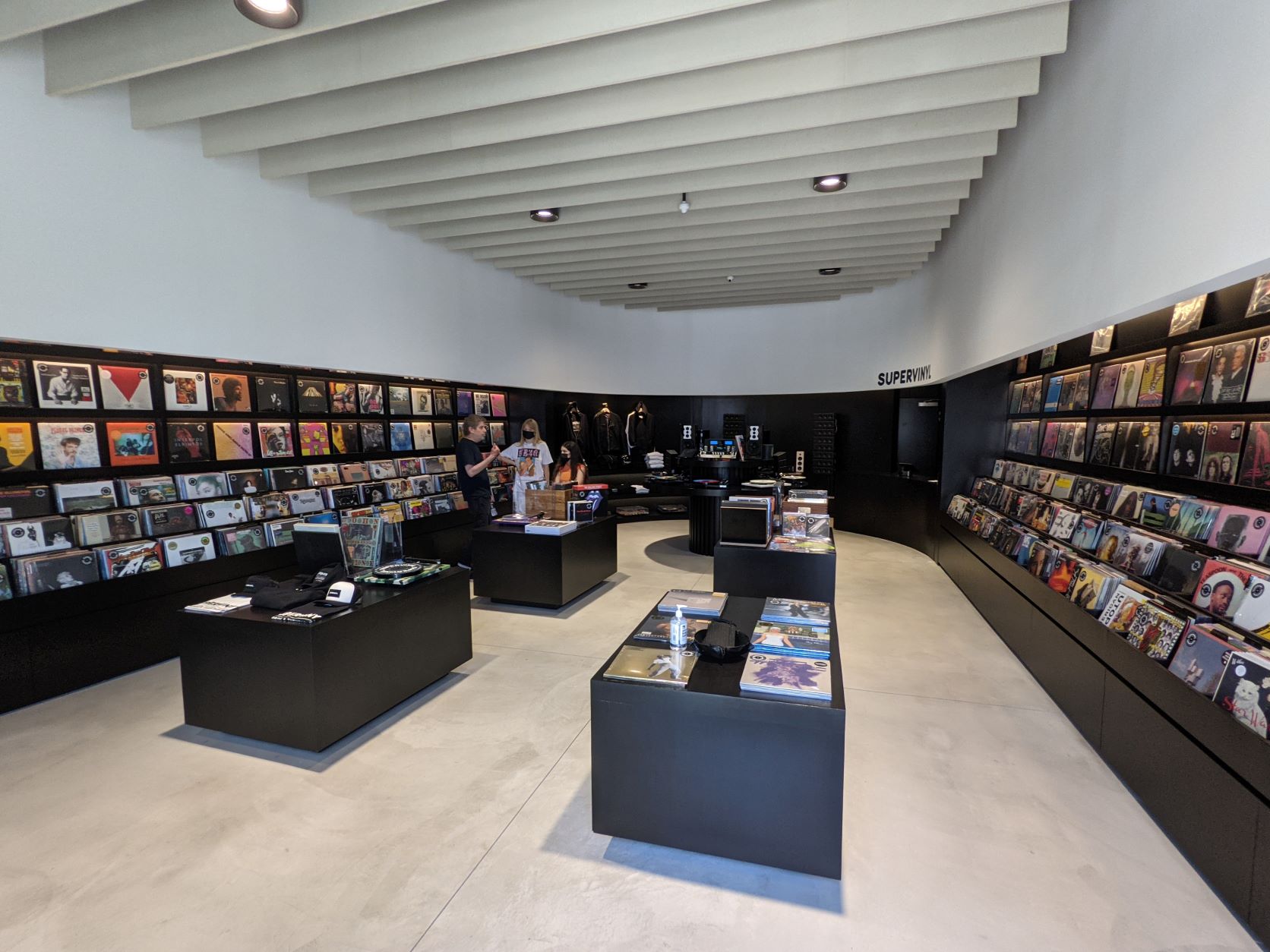
Name three things that you and your management team have implemented that you attribute to the success of the store?
BP: Well, I didn’t invent it, but I’d put customer service — really engaging with the customer — first. And then I’d say merchandising, which is something I’m bringing over from the clothing business. Supervinyl is kind of merchandised like a clothing store. We have all these tables in the middle of the store with box sets, clothing, and turntables, and that’s so unlike a typical record store. And we hit the floor every day and pull stuff down and put new stuff up – we’re constantly moving things around, which is the same thing we did in the blue jeans business. And we’re playing records all day. A lot of record stores don’t even play vinyl; they stream the music so they don’t have to flip the records over. I have no interest in that. We play vinyl eight hours a day.
What are your goals for the coming year?
BP: I don’t really set any goals. I’m just here to have a successful business, pay the rent, and kind of stay afloat, but I don’t have a grandiose plan. I’m working on new T-shirts constantly and I’m always trying to bring in new records – every week we get in a few hundred new LPs – and I always try to change up the store and try new things. We’re now also making record bins to hold records; we have a guy who makes them for us, custom. We want to keep working on new things so that the customers are always wowed when they come in.
In terms of audio brands, I’m going to continue to look for great brands. I’d love to add another turntable brand, something iconic. Maybe the Panasonic Technics turntables — they’re hard to find, even here in L.A.. I probably won’t deviate too much from the mix of categories we have now, though we do sell Sennheiser headphones, because that’s just a great brand.
Some of the coolest products at the store, in my opinion, are the custom-painted Rega turntables. What’s the story behind those?
BP: These are all hand-painted by local graffiti artists based on art that I give them. They’re all brand-new turntables. We take them apart and have these artists — guys I’ve known for a long time — hand paint them.
Is there anything in the building of your business that didn’t go as expected, and that you learned from?
BP: Well, it’s funny, but I’d probably say the hand-painted turntables. The first time everyone saw them, they flipped out and said, “Barry, these are going to fly off the shelves.” Well, we’ve sold them, but we didn’t sell out. But I’m okay with that, because if we sell out, then I have to make more of them and they’re hard to make. And I love having them in the store. I didn’t do it because I thought they would sell out; I just did it because it was just something that in my gut I wanted to do. But they’re more expensive than the standard Rega turntables – the P2 normally goes for $675, but this one is $1,800. That’s because I have to pay the artists, and it’s a process that usually takes about three months. I’m going to keep doing them. Maybe it’s just a matter of time and then it’ll click. Not everything happens overnight. Babe Ruth struck out more than any other baseball player, but he also hit more home runs than any other baseball player, so you’ve got to get up to the bat and swing and go for it. It’s good to be trendy and try different things that you don’t see in other record or audio stores.
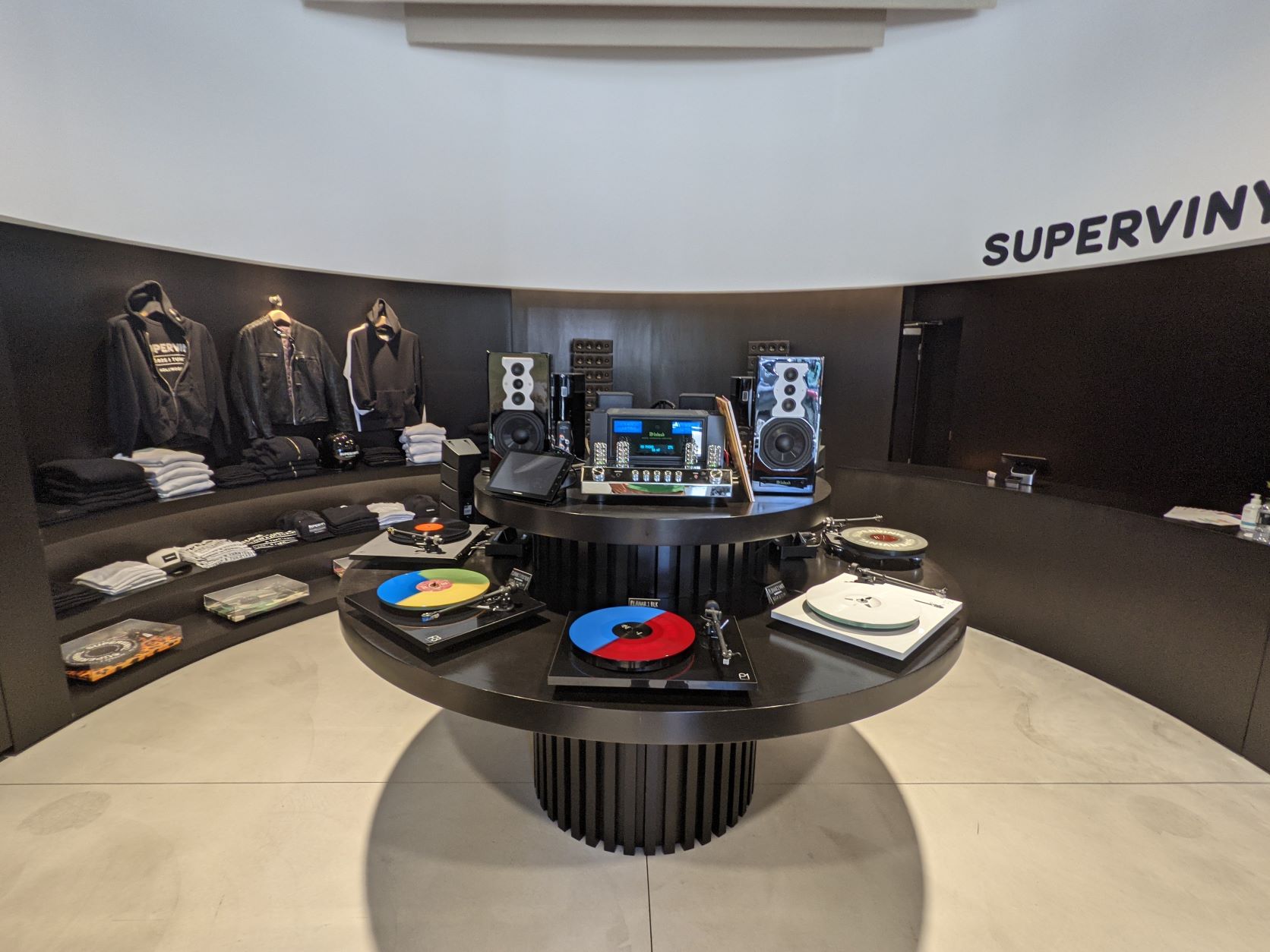
What’s your favorite part of the store?
BP: Well, I love moving these tables in the center of the store around. I also love this round table in the middle of the store with all the turntables on it. Even before I opened the store, I always pictured that round table with turntables on it, where people can test out and listen to records and turntables at the same time. I wanted it to almost feel like a gallery. Most record stores have one record and then 50 right behind it, so you’re really shopping down, but I worked with an architect to do tiered record bins, so you can see covers for six records in every row every time.
For more Q&A with Supervinyl’s Barry Perlman, listen to episode 113 of the Dealerscope podcast, which features additional questions and answers.
This article originally appeared in the November 2021 issue of Dealerscope.







